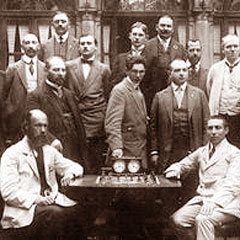Stepan Levitsky on:
[Wikipedia]
[Google]
[Amazon]
 Stepan (Stefan) Levitsky (Levitski, Lewitzki) (25 April 1876, in
Stepan (Stefan) Levitsky (Levitski, Lewitzki) (25 April 1876, in
Levitsky-Marshall, DSB Kongress 1912
Retrieved on 2009-03-27.
"Marshall's 'Gold Coins' Game" by Edward Winter
{{DEFAULTSORT:Levitsky, Stepan 1876 births 1924 deaths Chess players from the Russian Empire Chess theoreticians
 Stepan (Stefan) Levitsky (Levitski, Lewitzki) (25 April 1876, in
Stepan (Stefan) Levitsky (Levitski, Lewitzki) (25 April 1876, in Serpukhov
Serpukhov ( rus, Серпухов, p=ˈsʲerpʊxəf) is a types of inhabited localities in Russia, city in Moscow Oblast, Russia, located at the confluence of the Oka River, Oka and the Nara (Oka), Nara Rivers, 99 kilometers (62 miles) south fro ...
– 21 March 1924, in Glubokaya) was a Russian Chess Master.
In 1899 he took third place in Moscow
Moscow is the Capital city, capital and List of cities and towns in Russia by population, largest city of Russia, standing on the Moskva (river), Moskva River in Central Russia. It has a population estimated at over 13 million residents with ...
(All Russian Masters’ Tournament, first Russian Championship, Mikhail Chigorin
Mikhail Ivanovich Chigorin (also ''Tchigorin''; ; – ) was a Russian chess player. He played two World Championship matches against Wilhelm Steinitz, losing both times. The last great player of the Romantic chess style, he also served as a ma ...
won).
In 1903 he took eighth in Kiev
Kyiv, also Kiev, is the capital and most populous List of cities in Ukraine, city of Ukraine. Located in the north-central part of the country, it straddles both sides of the Dnieper, Dnieper River. As of 1 January 2022, its population was 2, ...
(third Russian Championship, Chigorin won).
In 1905/06 he tied for 8–11th in St Petersburg
Saint Petersburg, formerly known as Petrograd and later Leningrad, is the List of cities and towns in Russia by population, second-largest city in Russia after Moscow. It is situated on the Neva, River Neva, at the head of the Gulf of Finland ...
(fourth Russian Championship, Gersz Salwe won). In 1907 he took second, behind Eugene Znosko-Borovsky, in St Petersburg. He lost a match to Simon Alapin 0–5 at St Petersburg 1907.
Levitsky won at St Petersburg 1911 (All-Russian Amateur Tournament), thus becoming Russian national chess champion for one year. In July–August 1912, he tied for 13–14th in Breslau (18th DBS-Congress, Akiba Rubinstein
Akiba Kiwelowicz Rubinstein (1 December 1880 – 14 March 1961) was a Polish chess player. He is considered to have been one of the greatest players never to have become World Chess Champion. Rubinstein was granted the title International Grandma ...
and Oldřich Duras won). In August–September 1912, he took third in Vilna (eighth RUS-ch, Rubinstein won). In 1913 he lost a match to Alexander Alekhine
Alexander Aleksandrovich Alekhine. He disliked when Russians sometimes pronounced the of as , , which he regarded as a Yiddish distortion of his name, and insisted that the correct Russian pronunciation was . (March 24, 1946) was a Russian ...
3–7 in St Petersburg. In 1913/14, he took 13th in St Petersburg (ninth Russian Championship, Alekhine and Aron Nimzowitsch
Aron Nimzowitsch (; , ''Aron Isayevich Nimtsovich''; 7 November 1886 – 16 March 1935) was a Latvian-born Danish chess player and writer. In the late 1920s, Nimzowitsch was one of the best chess players in the world. He was the foremost f ...
won).
Legacy
Levitsky introduced the Queen's Bishop Attack, known as the Levitsky Attack (1.d4 d5 2.Bg5) in theQueen's Pawn Game
The Queen's Pawn Game is any chess opening starting with the move:
: 1. d4
It is the second-most popular opening move after 1.e4 (King's Pawn Game).
Terminology
The term "Queen's Pawn Game" is usually used to describe openings beginning wit ...
('' ECO'' code D00). But he is perhaps best remembered by chess players today as the loser in a famous game against Frank Marshall at Breslau 1912 (see Levitsky versus Marshall). Marshall (with the black pieces) concluded with the stunning 23...Qg3, which would have forced White to capture Black's queen to prevent immediate checkmate
Checkmate (often shortened to mate) is any game position in chess and other chess-like games in which a player's king is in check (threatened with ) and there is no possible escape. Checkmating the opponent wins the game.
In chess, the king is ...
. Unfortunately for Levitsky, this would have left Marshall with at least an extra piece (in one line) or a forced mate (in the other two lines). Levitsky resigned. According to legend, the beauty of Marshall's final combination so moved the spectators that they showered the board with gold pieces.Retrieved on 2009-03-27.
See also
*List of chess openings
This is a list of chess openings, organised by the ''Encyclopaedia of Chess Openings'' (''ECO'') code classification system. The chess openings are categorised into five broad areas ("A" through "E"), with each of those broken up into one hundred ...
* List of chess openings named after people
''The Oxford Companion to Chess'' lists 1,327 named openings and variants. Chess players' names are the most common sources of opening names. The name given to an opening is not always that of the first player to adopt it; often an opening is name ...
References
External links
*"Marshall's 'Gold Coins' Game" by Edward Winter
{{DEFAULTSORT:Levitsky, Stepan 1876 births 1924 deaths Chess players from the Russian Empire Chess theoreticians